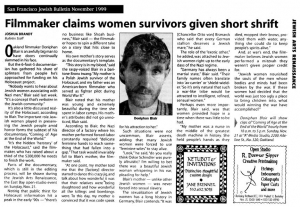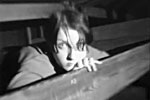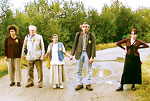"Our Holocaust Vacation" did not garner much press because it didn't place in any Jewish Film Festivals, and appeared in only a few other festivals, like the Miami Women's Festival. Nevertheless, a number of scholars, survivors, and educators loved the film, viewing it when it was shown almost 400 times on PBS, nation-wide, as well as at schools and Holocaust association gathering. And there was some press, see the Jewish Community Bulletin piece below. Here's a selection of comments:
"Our Holocaust Vacation" is a wonderful film! I found it powerful and moving to watch—and yes, sometimes even funny. I feel that it expresses extremely well both the sadness and complexity of our survivor parents' lives and the complex feelings and desires that we ourselves feel as children of survivors. - June 2011
It is one of the best Holocaust films I have seen. The film challenges genre conceptions and it challenges the audience. - October 2008
Elaina Viola, Masters Degree, Holocaust Film Studies, UCLA
Director Film Series, Grace Cathedral, San Francisco
Assistant to the Director Steven Spielberg during the making of 'Schindler’s List'
The film was very moving, full of tears, some humor and above all, the love of a family which has the guts to go for a deep emotional experience. - June 2009
National Association of Jewish Child Holocaust Survivors
I have been teaching high school social studies for 16 years and recently did two seminars at the Holocaust Museum. “Our Holocaust Vacation” was good because the daughter brings a current teen’s perspective to what happen 60 years ago. When you talk about the Holocaust there is a lot of depressing content. “Our Holocaust Vacation” has that but that is not the focus. It is more a family story: you can liken it to an orphan trying to find out about their family. - May 2010
My Ode to the Film:
Oh Yes! The guinea pig and the snail (two animals that figure in the film),
Then this must have been real.
But the woman was so forgiving and seemed so blessed,
funny how I remain so distressed.
You mean they paraded emaciated men naked?
Leading them like two-year olds?
Umm—and remember that train ride?
Two weeks no water, no food?
That defies logic, that defies Satan.
But in order to overcome, her only choice was to return,
Even to the place where the bodies burned.
Yes that's right, they show and tell, guinea pigs and snails,
as they toured along the rails—you see they are not so frail.
Amen - May 2011
Oakland filmmaker Doniphan Blair is an awfully big man to doors continually slammed in his face. But the 6', 5" documentarian has gathered his share of splinters from the people he's approached for funding.
"Nobody wants to hear about Jewish women associating with Nazi men," Blair said last week, "It's a concept verbotten in the Jewish community... Its the hidden 'Herstory' of the Holocaust."
His own mother's story serves as the documentary's template. Blair noted that his mother was young and extremely beautiful... attributes that did not go unnoticed. Blair's mother—unlike other Jewish women—was never forced into sexual slavery (but) the sexualization of Jewish women has long history in Germany... It was Chancellor Otto von Bismark who said that every German stallion deserves a Jewish mare.
"Germany has always been a martial state," Blair said. "Their women's names often translate into 'ax-carrier' and 'sheild=bearer.' It's only natural that such a war-like tribe would be attracted to intelligent, refined and sensual women. Even more importantly, Blair said, women provided hope were there was little to be had.
"My mother was a nurse in the greatest death machine in history. She held people's hands as they died, mopped their brow..."
"At the end of the war, Jewish women nourished the souls of the men whose bodies and minds had been broken by the war. If these women had decided that the world was just too ugly a place to bring children into, what would have winning the war accomplished?"
Joshua Brandt, writer
San Francisco Jewish Bulletin; 11/1999


